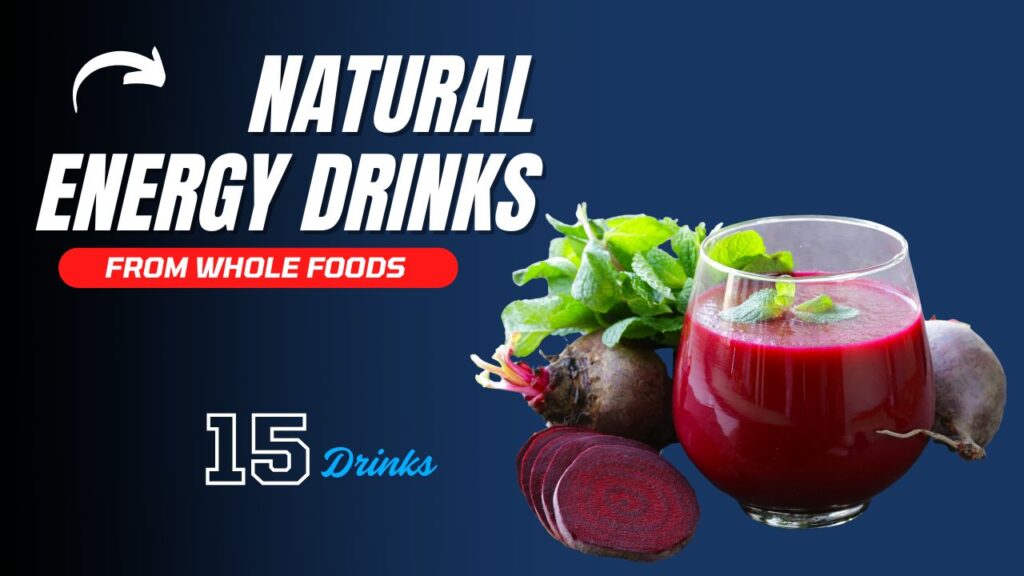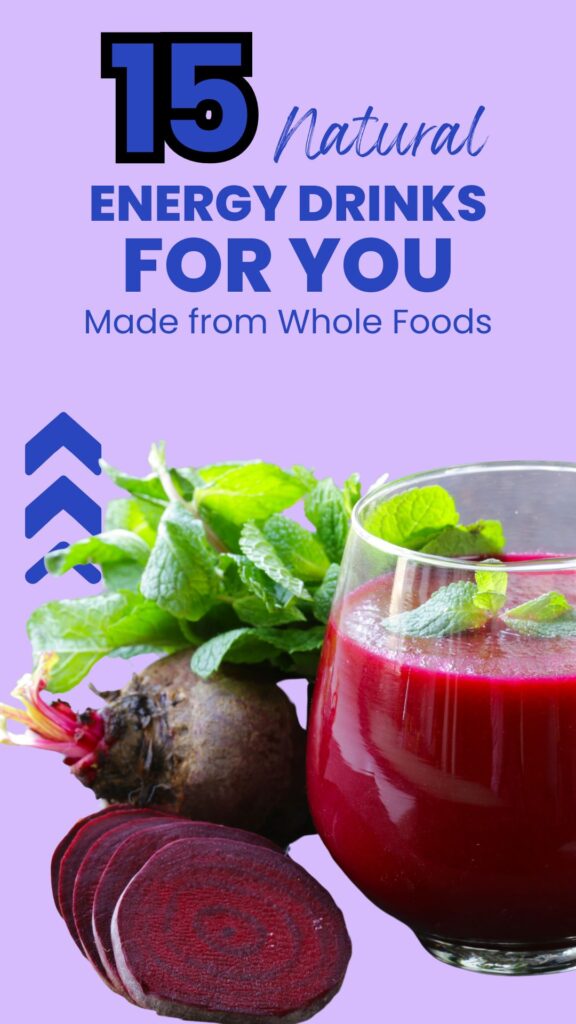Some links in this blog are affiliate links. If you make a purchase through these links, I may receive a small commission. This helps support the site at no extra cost to you.
Do you reach for coffee or store-bought energy drinks whenever fatigue hits? While they may give you a quick jolt, the crash that follows often leaves you feeling even more drained.
Interestingly, studies reveal that more than 60% of commercial energy drinks contain high sugar and artificial stimulants, which can spike blood pressure, disrupt sleep, and cause long-term health issues.
But here’s the good news: you don’t need synthetic energy boosters. Nature already provides powerful whole foods that can be blended, juiced, or steeped into natural energy drinks. These drinks not only lift your energy but also nourish your body with vitamins, minerals, antioxidants, and hydration.
In this post, we’ll explore 15 natural energy drinks made from whole foods, their benefits, best ways to use them, who should include them (or avoid them), storage tips, do’s and don’ts, and possible side effects.

Table of Contents

15 Best Natural Energy Drinks
1. Beetroot Juice
Best Ways to Use
- Freshly juiced with lemon and ginger.
- Add to smoothies with apple or carrot.
- Roast beets before blending for a milder flavor.
Who Should Eat / Avoid
- Good for: athletes, those with low iron, people with high blood pressure.
- Avoid if: you have kidney stones (high oxalate content) or low blood pressure.
Storage & Buying Tips
- Choose firm, deep-colored beets.
- Store in a cool, dry place for up to a week.
Do’s & Don’ts
✅ Do: Mix with citrus to enhance iron absorption.
❌ Don’t: Store beet juice for more than 24 hours; it loses potency.
Possible Side Effects
- May cause “beeturia” (red urine) – harmless but can be alarming.
2. Coconut Water
Best Ways to Use
- Drink chilled, straight from the coconut.
- Blend with pineapple for a tropical drink.
- Add to post-workout smoothies.
Who Should Eat / Avoid
- Good for: hydration after exercise, people prone to dehydration.
- Avoid if: you have kidney issues (high potassium).
Storage & Buying Tips
- Opt for fresh coconuts over packaged versions.
- Refrigerate after opening and consume within 24–48 hours.
Do’s & Don’ts
✅ Do: Use as a natural electrolyte replacement.
❌ Don’t: Confuse it with coconut milk (which is heavier and high in fat).
Possible Side Effects
- Excess intake may lead to stomach discomfort due to high potassium.
3. Matcha Green Tea
Best Ways to Use
- Whisk into hot water for a traditional tea.
- Blend with almond milk for a latte.
- Add to smoothies or baked goods.
Who Should Eat / Avoid
- Good for: students, professionals, those seeking sustained focus.
- Avoid if: you’re caffeine-sensitive or pregnant.
Storage & Buying Tips
- Buy bright green, finely powdered matcha.
- Store in an airtight container away from light.
Do’s & Don’ts
✅ Do: Pair with healthy fats (like coconut oil) for longer-lasting energy.
❌ Don’t: Drink late at night—it may disrupt sleep.
Possible Side Effects
- Overconsumption may cause jitteriness or digestive upset.
4. Lemon-Ginger Water
Best Ways to Use
- Infuse warm water with fresh lemon juice and grated ginger.
- Add honey for natural sweetness.
- Drink first thing in the morning for a metabolism boost.
Who Should Eat / Avoid
- Good for: digestion, immunity, and detox seekers.
- Avoid if: you have acid reflux or stomach ulcers.
Storage & Buying Tips
- Use fresh ginger roots and firm lemons.
- Store infused water in glass bottles, consume within 24 hours.
Do’s & Don’ts
✅ Do: Sip slowly to maximize absorption.
❌ Don’t: Overdo lemon—it can erode tooth enamel.
Possible Side Effects
- Excess consumption may cause heartburn in sensitive individuals.
5. Spinach & Kale Green Smoothie
Best Ways to Use
- Blend spinach, kale, apple, and banana.
- Add chia seeds or flaxseeds for extra nutrition.
Who Should Eat / Avoid
- Good for: weight-loss seekers, those low in iron or folate.
- Avoid if: you have kidney issues (high oxalates).
Storage & Buying Tips
- Store leafy greens in breathable bags.
- Drink smoothies immediately after blending for best nutrients.
Do’s & Don’ts
✅ Do: Pair with vitamin C fruits to boost iron absorption.
❌ Don’t: Add too much fruit—it increases sugar content.
Possible Side Effects
- Overconsumption of raw greens may affect thyroid (due to goitrogens).
6. Pomegranate Juice
Best Ways to Use
- Juice fresh arils.
- Add to sparkling water for a refreshing drink.
- Mix with green tea for a power antioxidant blend.
Who Should Eat / Avoid
- Good for: heart health, men’s vitality, athletes.
- Avoid if: you’re on blood thinners (it may interact).
Storage & Buying Tips
- Select heavy pomegranates with shiny skin.
- Store arils in the fridge for up to 5 days.
Do’s & Don’ts
✅ Do: Combine with mint for a cooling effect.
❌ Don’t: Rely on bottled juice with added sugars.
Possible Side Effects
- May lower blood pressure excessively if combined with certain medications.
7. Chia Fresca (Chia Water)
Best Ways to Use
- Soak chia seeds in water with lemon.
- Add honey or natural fruit juice for flavor.
Who Should Eat / Avoid
- Good for: endurance athletes, those needing fiber.
- Avoid if: you have swallowing issues (gel-like texture may be risky).
Storage & Buying Tips
- Use raw, black or white chia seeds.
- Store seeds in an airtight container in a cool place.
Do’s & Don’ts
✅ Do: Drink 20–30 minutes before workouts for sustained energy.
❌ Don’t: Consume dry chia seeds without soaking.
Possible Side Effects
- Excess can cause bloating or constipation.
8. Almond Milk Smoothie
Best Ways to Use
- Blend unsweetened almond milk with banana and oats.
- Add cocoa powder or berries for antioxidants.
- Use as a post-workout recovery shake.
Who Should Eat / Avoid
- Good for: vegans, lactose-intolerant individuals, and weight watchers.
- Avoid if: you have a nut allergy.
Storage & Buying Tips
- Choose unsweetened almond milk to avoid excess sugar.
- Homemade versions are best—soak almonds overnight before blending.
Do’s & Don’ts
✅ Do: Pair with protein powder for a balanced meal.
❌ Don’t: Rely on flavored almond milk; it often contains added sugar.
Possible Side Effects
- Some brands may contain additives that upset digestion.
9. Turmeric Latte (Golden Milk)
Best Ways to Use
- Warm milk (dairy or plant-based) with turmeric, black pepper, and honey.
- Add cinnamon or ginger for extra warmth.
Who Should Eat / Avoid
- Good for: boosting immunity, reducing inflammation, aiding sleep.
- Avoid if: you have gallstones or are on blood-thinning medications.
Storage & Buying Tips
- Use fresh turmeric root if possible.
- Store powder in airtight jars, away from moisture.
Do’s & Don’ts
✅ Do: Always add a pinch of black pepper for better curcumin absorption.
❌ Don’t: Drink on an empty stomach if you’re sensitive—it may cause nausea.
Possible Side Effects
- Excess turmeric may cause stomach upset.
10. Watermelon Juice
Best Ways to Use
- Blend fresh watermelon chunks, no sugar needed.
- Add lime juice and mint leaves for a refreshing twist.
- Freeze into cubes for cooling drinks.
Who Should Eat / Avoid
- Good for: hydration, post-exercise recovery, hot climates.
- Avoid if: you have high blood sugar (consume in moderation).
Storage & Buying Tips
- Pick heavy melons with a yellow ground spot (sign of ripeness).
- Store cut pieces in the fridge, consume within 2 days.
Do’s & Don’ts
✅ Do: Drink chilled for maximum refreshment.
❌ Don’t: Add extra sugar—watermelon is naturally sweet.
Possible Side Effects
- Excess intake may cause bloating due to high water content.
11. Oat Banana Shake
Best Ways to Use
- Blend rolled oats, banana, and milk (or plant milk).
- Add nut butter for extra protein.
- Sprinkle cinnamon for flavor.
Who Should Eat / Avoid
- Good for: breakfast, athletes, and children.
- Avoid if: you’re gluten-sensitive (use gluten-free oats instead).
Storage & Buying Tips
- Store oats in airtight containers to avoid moisture.
- Use ripe bananas for natural sweetness.
Do’s & Don’ts
✅ Do: Drink as a meal replacement for busy mornings.
❌ Don’t: Use instant oats—they lack fiber.
Possible Side Effects
- Overeating may lead to excess calories.
12. Ginseng Herbal Tea
Best Ways to Use
- Steep ginseng root in hot water for 5–10 minutes.
- Add honey or lemon for taste.
Who Should Eat / Avoid
- Good for: students, professionals, and older adults needing focus.
- Avoid if: you have high blood pressure, insomnia, or are pregnant.
Storage & Buying Tips
- Choose dried ginseng roots or quality tea bags.
- Store in a cool, dry place.
Do’s & Don’ts
✅ Do: Drink in the morning for energy.
❌ Don’t: Consume late at night—it may cause restlessness.
Possible Side Effects
- Can cause headaches, nervousness, or insomnia if overused.
13. Fresh Orange-Carrot Juice
Best Ways to Use
- Juice fresh oranges and carrots together.
- Add ginger for an immune boost.
- Mix with turmeric for extra antioxidants.
Who Should Eat / Avoid
- Good for: vision, skin health, immunity.
- Avoid if: you’re diabetic (monitor sugar levels).
Storage & Buying Tips
- Choose firm carrots and heavy oranges.
- Drink immediately for maximum vitamin C.
Do’s & Don’ts
✅ Do: Combine with leafy greens for added nutrition.
❌ Don’t: Store for more than a few hours—vitamin C degrades quickly.
Possible Side Effects
- Overconsumption may turn skin slightly orange (harmless).
14. Dates & Milk Shake
Best Ways to Use
- Soak dates overnight for easy blending.
- Blend with warm milk for a natural energy boost.
- Add almonds or cashews for creaminess.
Who Should Eat / Avoid
- Good for: breaking fasts, anemia patients, and growing children.
- Avoid if: you have diabetes (high natural sugar).
Storage & Buying Tips
- Use soft Medjool dates for natural sweetness.
- Store dates in airtight containers to prevent drying.
Do’s & Don’ts
✅ Do: Pair with nuts for a complete snack.
❌ Don’t: Add extra sugar—dates are naturally sweet.
Possible Side Effects
- Excess may spike blood sugar levels.
15. Cucumber-Mint Water
Best Ways to Use
- Infuse sliced cucumber and mint in water overnight.
- Add lemon for extra flavor.
- Serve chilled.
Who Should Eat / Avoid
- Good for: detox seekers, hydration, digestion support.
- Avoid if: you have low blood pressure (cucumber is cooling).
Storage & Buying Tips
- Use fresh cucumbers with firm skin.
- Store infused water in glass bottles, consume within 24 hours.
Do’s & Don’ts
✅ Do: Drink during hot weather for hydration.
❌ Don’t: Reuse cucumber slices more than once.
Possible Side Effects
- Overconsumption may cause bloating.
16. Apple-Celery Juice
Best Ways to Use
- Blend green apples with celery stalks.
- Add cucumber or lemon for extra freshness.
- Drink as a mid-morning energizer.
Who Should Eat / Avoid
- Good for: detox, weight management, hydration.
- Avoid if: you have celery allergy or sensitive digestion.
Storage & Buying Tips
- Select crisp apples and fresh celery stalks.
- Consume immediately to avoid browning.
Do’s & Don’ts
✅ Do: Combine with ginger for better digestion.
❌ Don’t: Use pre-packaged celery juice—it loses nutrients quickly.
Possible Side Effects
- May cause bloating or diarrhea if consumed in excess.
Conclusion
Nature truly provides the best fuel for your body. From the nitrate power of beetroot to the hydrating effect of watermelon and coconut water, and the calming yet energizing benefits of turmeric latte and matcha, each of these 15 natural energy drinks brings unique strengths.
Unlike store-bought energy drinks that rely on sugar and synthetic stimulants, these whole-food-based options give you:
- Steady, long-lasting energy.
- Improved hydration and nutrient absorption.
- Extra benefits for immunity, digestion, and mental clarity.
So the next time you feel drained, skip the artificial options and choose one of these natural drinks. Experiment with flavors, mix different combinations, and find the ones that fit your lifestyle best.
Which one will you try today—refreshing cucumber-mint water, creamy dates and milk shake, or energizing beetroot juice? Share your favorite recipes in the comments below!
Frequently Asked Questions (FAQs)
Which natural energy drink is best for athletes?
Beetroot juice, chia fresca, and coconut water are excellent choices for athletes. They help improve stamina, boost oxygen flow, and replenish electrolytes after workouts.
Can natural energy drinks replace coffee?
Yes, drinks like matcha green tea, ginseng tea, and turmeric latte provide a gentle energy boost without the caffeine jitters and crashes of coffee. However, if you’re used to high caffeine intake, switching gradually is best.
Are natural energy drinks safe for kids?
Yes, most are safe when made from whole foods like fruits, vegetables, and milk. Options like oat-banana shakes, dates and milk, or orange-carrot juice are particularly kid-friendly. Avoid drinks with strong herbs (like ginseng) or too much caffeine (like matcha).
Can these drinks help with weight loss?
Yes, drinks like cucumber-mint water, apple-celery juice, and green smoothies are low in calories, hydrating, and help control appetite. Pair them with a balanced diet for the best results.
Are there side effects of drinking these daily?
Most natural energy drinks are safe when consumed in moderation. However, excess consumption may lead to side effects such as bloating (chia seeds, cucumber water), stomach upset (turmeric), or high sugar intake (dates, watermelon). Balance is key.
How often should I drink natural energy drinks?
You can safely enjoy 1–2 servings daily, depending on the type. For example, coconut water post-workout, a green smoothie in the morning, or turmeric latte in the evening are excellent ways to space them out.
Can I make these drinks in advance?
Some drinks, like infused waters (cucumber-mint, lemon-ginger) or chia fresca, can be made ahead and stored in the fridge for 24 hours. Fresh juices (like beetroot or orange-carrot) should be consumed immediately for maximum nutrients.










